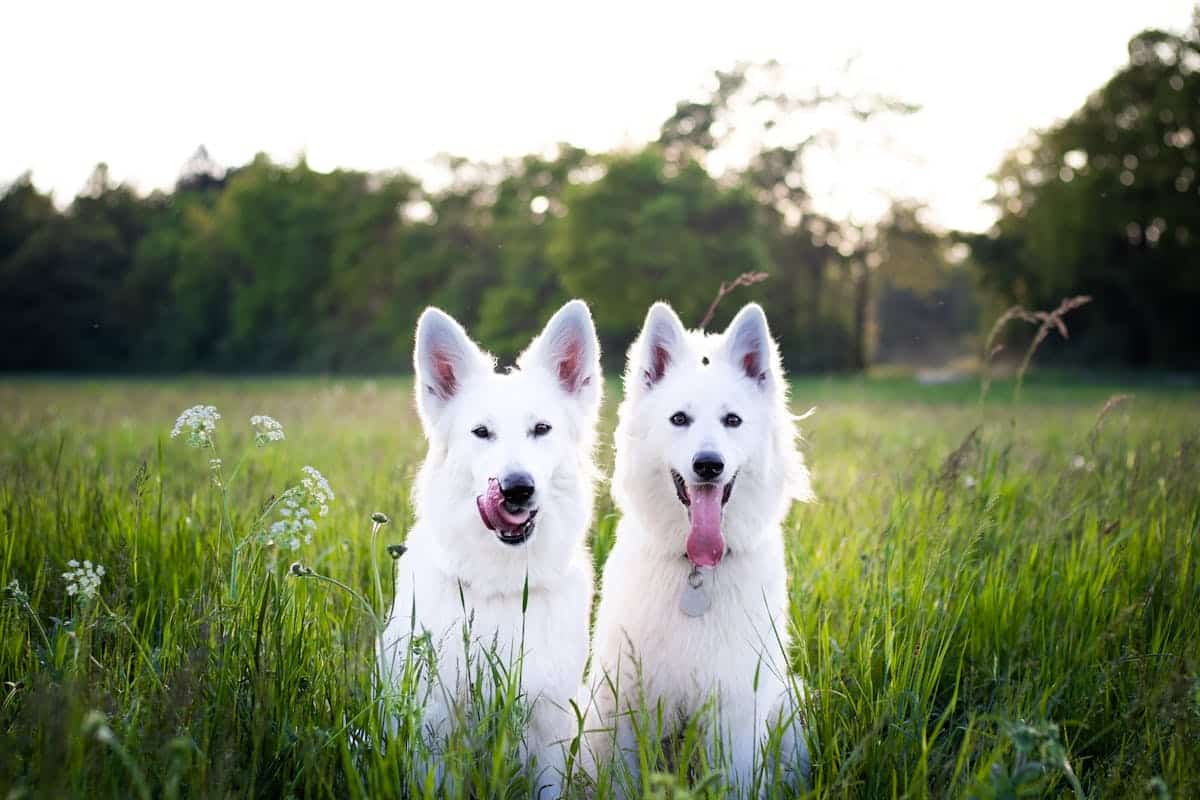When dogs eat grass, it often looks like an anomaly; however, it is more common than you think. Dogs have captivated human curiosity for millennia, not just with their loyalty and companionship but also with their sometimes puzzling behaviors.
One of the most intriguing habits is their penchant for eating grass. This seemingly odd behavior has sparked countless questions among pet owners.
To better understand this phenomenon, we delve into the reasons behind why dogs eat grass, combining scientific insights, behavioral theories, and practical observations.
Table of Contents
Toggle7 Reasons Why Dogs Eat Grass
1. Instinctual Behavior
Remnants of Ancestral Traits
Domesticated dogs share DNA with their wild ancestors, such as wolves. In the wild, these animals consume entire prey, including stomach contents that often contain vegetation. Eating grass may be a vestige of this evolutionary trait, reflecting a primal need to balance their diet.
Survival Mechanisms
Grass consumption might also stem from a survival instinct. In times of scarcity, early canines might have relied on grass and other plants as supplementary nutrition. By consuming plant material, they could sustain themselves until other food sources became available.
2. Dietary Deficiencies
Lack of Fiber
One common theory is that dogs eat grass to compensate for a lack of fiber in their diet. Fiber aids digestion, regulates bowel movements, and helps maintain gut health. Without sufficient fiber, dogs may instinctively turn to grass as a natural source.
Insufficient Nutrients
Dogs fed on poor-quality kibble or an unbalanced diet may instinctively turn to grass to make up for missing nutrients such as minerals or vitamins. Supplementing your dog’s diet with leafy greens or high-quality dog food can help curb this behavior.
3. Digestive Health
Self-Medication
Some dogs eat grass as a form of self-medication. Grass consumption can induce vomiting, which helps them rid their stomachs of indigestible materials or toxins. This behavior is particularly common if the dog has consumed something harmful or feels unwell.
Relief from Gastrointestinal Discomfort
If a dog has an upset stomach or mild digestive issues, eating grass might soothe their discomfort or stimulate bowel movements. This is thought to be a natural remedy dogs use to alleviate temporary digestive distress.
4. Behavioral Causes
Boredom
Dogs often eat grass when they’re bored. A lack of stimulation or exercise can lead to quirky behaviors, including nibbling on the nearest patch of greenery. Providing toys, interactive games, or more outdoor playtime can reduce boredom-induced grass-eating.
Anxiety
Stress or anxiety can prompt dogs to engage in repetitive actions like grass-eating. This behavior may serve as a coping mechanism to relieve tension.
Identifying and addressing the root cause of the anxiety—such as separation anxiety or environmental stress—can help mitigate this habit.
5. Exploration and Play
Natural Curiosity
Dogs explore their environment primarily through taste and smell. Grass-eating may simply be an extension of this exploratory behavior. Puppies, in particular, are more likely to engage in this as part of learning about their surroundings.
Texture and Sensation
The texture of grass could appeal to some dogs, providing a sensory experience that is satisfying or entertaining. Some dogs may even enjoy the crunchiness of grass blades.
6. Habitual Behavior
Learned Patterns
Some dogs develop a habitual preference for eating grass. This habit might be reinforced over time if they find it enjoyable or rewarding. Breaking this habit may require consistent training and positive reinforcement.
Social Mimicry
Dogs are social creatures and often imitate the behavior of others. If they observe other dogs eating grass, they might follow suit. This behavior could also be influenced by the dog’s perception of group dynamics.
7. Environmental Factors
Availability of Grass
Access to lush, green grass might naturally encourage consumption. Dogs are opportunistic and may eat grass simply because it is there. Keeping your yard or walking areas free of overly tempting grass can help manage this.
Pesticides and Chemicals
Grass treated with pesticides or chemicals could inadvertently entice dogs due to the smell, which they might mistake for food. Always ensure your dog’s environment is safe and free of harmful substances.
Myths and Misconceptions
Dogs Only Eat Grass When Sick
While some dogs eat grass when feeling unwell, many consume it even when perfectly healthy. This undermines the notion that grass-eating is exclusively linked to illness and highlights the multifaceted reasons behind the behavior.
Grass-Eating Means Nutritional Deficiency
Although dietary deficiencies can explain some cases, many grass-eating dogs receive balanced diets, suggesting other motivations. Observing your dog’s overall health and behavior can provide clearer insights.
Potential Risks of Grass Eating
Toxic Plants
Not all grass is safe. Some species or treated lawns can pose toxicity risks to dogs. Plants like Bermuda grass or those treated with herbicides can be particularly dangerous.
Intestinal Blockages
Ingested grass can sometimes clump together and create blockages, especially if eaten in large quantities. Monitoring the amount of grass your dog consumes can prevent this.
Parasites
Grass can harbor parasites or harmful bacteria that may infect your dog. Regular deworming and preventive care can mitigate these risks.
Preventing Excessive Grass-Eating
Providing a Balanced Diet
Ensure your dog’s diet includes all essential nutrients, particularly fiber, to minimize grass consumption driven by nutritional deficiencies. Consult a veterinarian to design a tailored diet plan.
Enrichment Activities
Engage your dog in physical and mental activities to alleviate boredom and anxiety, reducing the likelihood of grass-eating. Puzzle toys, agility training, and daily walks can help keep your dog’s mind occupied.
Training and Redirection
Using positive reinforcement techniques, train your dog to avoid grass-eating. Redirect their attention with treats or toys when they attempt to eat grass.
When to Consult a Veterinarian
Persistent Vomiting
If your dog repeatedly vomits after eating grass, it’s crucial to seek veterinary advice. Persistent vomiting could indicate underlying health issues such as gastrointestinal disorders.
Changes in Behavior
A sudden increase in grass-eating or other unusual behaviors may indicate underlying health issues. A thorough veterinary examination can rule out potential problems.
Signs of Toxicity
If your dog shows signs of lethargy, drooling, or unusual stool after eating grass, consult a veterinarian immediately. These could be signs of exposure to harmful chemicals or plants.
Conclusion
Dogs eat grass for various reasons—instinct, diet, digestive health, and behavior. While this habit is often harmless, it’s essential to monitor your dog’s grass-eating tendencies to ensure their safety and well-being.
By understanding this behavior and implementing preventive measures, pet owners can better cater to their canine companions’ needs, fostering a healthier and more harmonious relationship. Remember to consult a veterinarian when in doubt to address any potential health concerns effectively.






